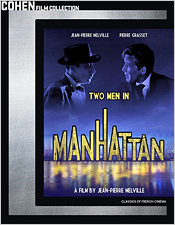Two Men in Manhattan (Blu-ray Review)

Director
Jean-Pierre MelvilleRelease Date(s)
1959 (September 17, 2013)Studio(s)
Cohen Film Collection- Film/Program Grade: B
- Video Grade: A-
- Audio Grade: A-
- Extras Grade: C+
Review
Jean-Pierre Melville’s Two Men in Manhattan (aka Deux hommes dans Manhattan) may not be one of the director’s best and most-remembered works, but that’s no reason to dismiss it completely. After all, it features many of the visual and aesthetic qualities that he is known for. The fact that it wasn’t distributed in the U.S. in 1959 as a part of the French New Wave is the real shame of it all.
The film tells the story of a journalist and a photographer in New York who are on the trail of a missing United Nations delegate. Their search leads them to not only the man that they’re looking for, but also a split between the two of sticking to strong ideals or the exploitation of their subject.
Jean-Pierre Melville spent his career as an independent filmmaker, and his output certainly reflects that. It also reflects the typical qualities that many of the films from the French New Wave contained: independent filmmaking, on location work and both allusions and tributes to the films of Hollywood. Two Men in Manhattan has strong visual ties to The Asphalt Jungle, which was Melville’s favorite film, so not being a part of the era it fit into so well, especially for American audiences, must have been a disappointment. It’s also the only film he ever made that Melville played the lead part in. Although he played smaller roles (most notably in Jean-Luc Godard’s Breathless), having the lead role opposite Pierre Grasset was definitely a change of pace. The film was also shot on location in New York for exteriors while interiors were done in Paris. The lower budget shows during some of the nighttime scenes, but it doesn’t really matter because of how well and how precise the scenes between the characters are filmed.
The problem is really with the story, as it takes a bit of a turn and avoids what films of its type usually do. Film noirs, traditionally (as with this film) introduce the plot element that gets the story going, which is either a death or the promise of one. In other words, intrigue. It really switches gears when it becomes more about our lead characters and never resolves the story it sets up. It’s not a bad idea, but our leads our just not that interesting. We don’t learn a whole lot about them, and what we learn about them later is just basic character motivations, never digging any deeper than that. At a lean 85 minutes, the film feels like it’s missing something. To be fair, it wasn’t intended to feel that way, but because of it going in a different direction, it does. Still, as a noir film, it’s a good one. As a French New Wave film? It’s a little questionable, but at times it feels like it does, indeed, belong.
For the film’s Blu-ray debut, the Cohen Film Collection puts on a very fine presentation. Because of the aforementioned differences between location and studio work, it’s not always fine. Some of the darker street scenes in particular are a bit too dark, and no attempt has been made to pump up the contrast and get more out of them. That’s a good thing, but it does illustrate the higher quality picture seen in the studio material. When it switches to these scenes, there’s a very fine level of film grain and a great amount of detail on display. Shadow delineation is good, while not being totally perfect. Black levels are very good, as is contrast and brightness. The audio portion of the proceedings, which is a single French/English 2.0 LPCM track (mono), is very good without being totally phenomenal. It shows its age, and some of the overdubs are pretty obvious, but for what it is, it’s good. Dialogue is pretty clear, the music has some nice boost to it, and both the sound effects and ambience are good. There’s not much dynamic range to it, but it works well for what it is. Subtitles are optional in English.
As for the extras, they’re very brief and to the point. There’s the featurette Keeping Up Appearances, which is a conversation between film critics Jonathan Rosenbaum and Ignatiy Vishnevetsky; both the original French theatrical trailer and the re-release trailer; and an insert booklet with an essay by Melville scholar Ginette Vincendeau. These extras may be brief, but it’s nice to have them included, and one shouldn’t expect too much from a film with not much of a reputation in the film community at all. Overall, it’s a very fine Blu-ray presentation of the film, which is good enough.
-Tim Salmons

